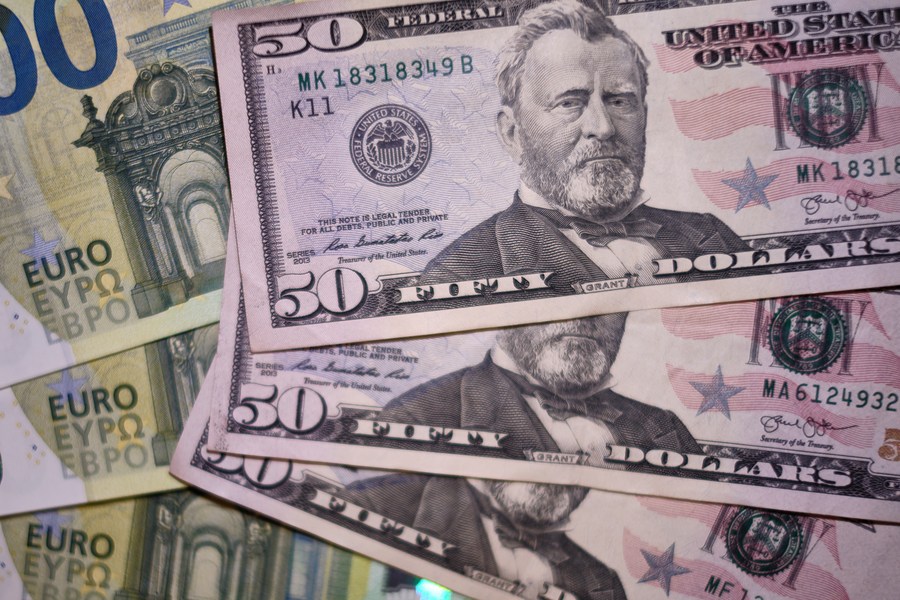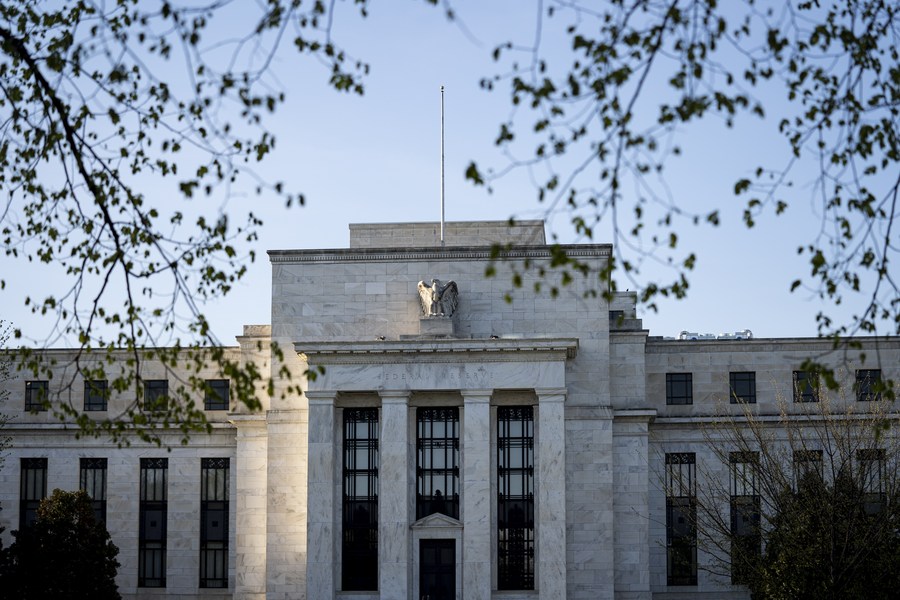Growing global recession fears as Fed's aggressive rate hikes export inflation
* The United States has once again used the U.S. dollar's overwhelming might to transfer the crisis to the rest of the world.
* The Fed's latest jumbo-size rate hike prompted global indexes to seesaw as investors were absorbing the bank's hawkish rate message and commitment to continuing hikes into next year.
* By shifting the burden of inflation to the rest of the world, the United States is creating economic havoc for the poor.
* "Dollar hegemony" has enabled the United States to hold the world hostage to pay heavily for its own experiment and policy mistakes.
BEIJING, Oct. 3 (Xinhua) -- Since March, the U.S. Federal Reserve has lifted interest rates five times, including three consecutive 75-basis-point rate hikes in June, July and September, boosting the U.S. central bank's benchmark interest rate to a range of 3-3.25 percent.
In its fight against domestic inflation, the United States has once again used the U.S. dollar's overwhelming might to transfer the crisis to the rest of the world, regardless of repeated warnings by economists that the hikes will disrupt the world economy and foreshadow a recession.
Emerging markets and developing countries will bear the brunt in particular.

People shop at a local supermarket in Washington, D.C., the United States, Sept. 13, 2022. (Photo by Ting Shen/Xinhua)
DISRUPTED GLOBAL ECONOMY
The Fed's latest jumbo-size rate hike prompted global indexes to seesaw as investors were absorbing the bank's hawkish rate message and commitment to continuing hikes into next year.
All three Wall Street benchmarks finished more than 1.7 percent down on Sept. 22 in the wake of the Fed's announcement amid rising recession fears. On the following trading day, the pan-European Stoxx 600 closed down 1.8 percent, with almost all sectors and major bourses in negative territory.
Meanwhile, the greenback has hit historic highs against a wide range of key foreign currencies, including the British pound, whose value against the dollar dropped more than 20 percent from the end of 2021 till last week; the euro, which sells for less than 1 dollar on foreign exchange markets; and the Japanese yen, which recorded a 24-year low.
Ron Insana, a CNBC senior analyst, warned against the Fed's aggressive tactics of exporting inflation to other countries and making U.S. goods more expensive in overseas markets. "The accelerating surge in global interest rates, the extremely rapid appreciation of the dollar and the parallel plunge in global equities" led him to conclude that "we're reaching the unacceptable point now."
The spillover effect of the rate hikes, such as weakening other major currencies, spurring capital outflows from developing countries and hiking up the amount of debt payments, has triggered numerous knotty problems in the global economic and financial system.

The euro and U.S. dollar banknotes are pictured in Madrid, Spain, Aug. 23, 2022. (Xinhua/Meng Dingbo)
Higher Fed interest rates versus the European Central Bank's rates "will likely continue to drive investors to switch from euros to dollars, leading to a further devaluation of the euro," said Philipp Lausberg. The European Policy Center analyst predicted the eurozone might also see worsening inflation, tighter lending conditions and a spike in non-performing loans.
What the United States has done will "have a knock-on effect for other parts of the world, and it's more emerging markets which are much more closely tied in financial terms to the dollar, where the impact is most pronounced," Professor Iain Begg of the London School of Economics and Political Science told Xinhua.
In the near term, the dollar's appreciation will inflict inflation on importing countries and capital loss on emerging markets; in the longer run, the Fed's rapid rate increases may propel the world's largest economy into stagflation and recession. Such a circumstance spells a "double whammy," especially for developing countries, Anna Malindog-Uy, vice president of the Manila-based think tank Asian Century Philippines Strategic Studies Institute, told Xinhua.
MAKE THE POOR POORER
The Fed's rate hikes are aimed at tamping down record inflation at home, as the Consumer Price Index in August surged 8.3 percent from a year ago, and the figure has remained above 8 percent since March.
However, the Fed's radical measures are regarded by observers as harming others without benefiting itself, particularly given that U.S. Treasury Secretary Janet Yellen on Sept. 22 estimated that the Fed might not meet its 2 percent inflation target next year.
"The huge spillover effect of the Fed's interest rate hikes will have obvious negative impacts on the world economic prospect," said Chen Fengying, a researcher at the China Institutes of Contemporary International Relations, adding that emerging economies and developing countries will be the most affected.
By shifting the burden of inflation to the rest of the world, the United States is creating economic havoc for the poor.
With the strengthening of the dollar, JPMorgan data showed that the first seven months of this year had seen a 50-billion-dollar exodus from emerging market bond holdings, thereby increasing the risk for fragile emerging economies of falling into a debt trap.
The massive capital flight has taken a heavy toll on highly indebted emerging economies such as Sri Lanka and Lebanon, which have tipped into insolvency. Other poor nations in Africa and Latin America are also waiting in the wings, said a recent Nikkei opinion article.
The Fed's rate hikes have aggravated the solvency of Argentina, which is deeply indebted to the International Monetary Fund (IMF) and suffering the worst inflation in 30 years. "Capital will leave our country for more conservative places in order to increase wealth, which takes investment away from us and also modifies internal rates," Argentine economist Hernan Bergstein told Xinhua.
Along with still rampant inflation, rising interest rates also weigh on U.S. households and businesses.

Pedestrians walk past a restaurant in Washington, D.C., the United States, on May 6, 2022. (Photo by Ting Shen/Xinhua)
Dean Baker, senior economist at the Center for Economic and Policy Research, said in a recent article that the Fed has revealed its willingness to "make the most disadvantaged groups" suffer.
"What we are talking about the Fed's rate hikes is throwing people out of work to put downward pressure on wages," Baker said.
The Fed's hawkish stance has already caused the bursting of the equity and credit market bubble, said Desmond Lachman, senior fellow at the American Enterprise Institute and a former IMF official, who estimated that since the start of the year, declining equity and bond market prices have resulted in the evaporation of around 12 trillion dollars in household wealth.
WORLD ECONOMY HOSTAGE TO DOLLAR
Although supply chain issues, surging demand and production costs, among other factors, all play a role in ramping up U.S. inflation to a four-decade high, the impact of Washington's swaths of relief funds during the COVID-19 pandemic shouldn't be underestimated.
The Fed's policy change in 2020 to give more weight to bringing down unemployment than keeping a lid on inflation is in some ways "a big mistake," said Edward Yardeni, president of Yardeni Research, Inc., a U.S. provider of investment strategies, referring to the relief packages totaling around 5 trillion dollars between Donald Trump's and Joe Biden's administrations.
In the current situation, simply lifting interest rates without a tighter fiscal policy won't be enough to cool inflation. Jason Furman, a Harvard economist who served as an adviser to Former U.S. President Barack Obama, put it directly: "raising rates, at this point, is more about trying to get lucky."
Unfortunately, "dollar hegemony" has enabled the United States to hold the world hostage to pay heavily for its own experiment and policy mistakes.

Photo taken on April 20, 2022 shows the U.S. Federal Reserve building in Washington, D.C., the United States. (Xinhua/Liu Jie)
Mao Shoulong, a professor at Renmin University of China, said there is a significant negative spillover effect from the radical adjustment of U.S. monetary policy. Because the world's currencies are closely related to the dollar, the macroeconomic policies of the United States, including monetary and fiscal policies, have worldwide effects.
Synchronized interest rate hikes by central banks prompted by the Fed are pushing the global economy into a recession -- a rising concern shared by the World Bank, the World Trade Organization and high-profile economics figures.
Ned Davis Research, a Florida-based research firm known for its Global Recession Probability Model, has raised the likelihood of a global recession next year to 98.1 percent, the highest since the pandemic-related downturn in 2020 and the 2008-2009 financial crisis.
"For the rest of the world, it's a no-win situation," said Eswar Prasad, a Cornell economics professor and Brookings senior fellow.
"We have debated for years that the American dollar has brought misery and inflation to the world. We argue that this system needs to change. But the world is ignoring the inflation especially brought by the U.S. dollar," Murat Tufan, an analyst with Turkish broadcaster Ekoturk, told Xinhua.
Tufan said that inflation in developing countries would become hyperinflation with disturbances in production unless the dollar's hegemony ends.
Photos
Related Stories
- Eurozone inflation sets another record, hitting 10 pct in September
- U.S. Dow plunges further into bear territory amid hawkish Fed fears
- High U.S. inflation caused by corporate greed: The Guardian
- Australian welfare recipients struggle as inflation surges
- Interview: U.S. inflation unmanageable despite Fed's rate hikes, says Turkish economist
- U.S. Dow drops on another Fed rate hike
- U.S. Fed enacts third straight three-quarter-point rate hike amid persistent inflation
- U.S. Nobel Prize winner warns Fed risks "disgrace" if let inflation unchecked
- Sustained high inflation in the U.S. increases burden of mounting living costs on American residents
- U.S. Inflation Reduction Act example of "deceptive marketing": Heritage Foundation
Copyright © 2022 People's Daily Online. All Rights Reserved.









